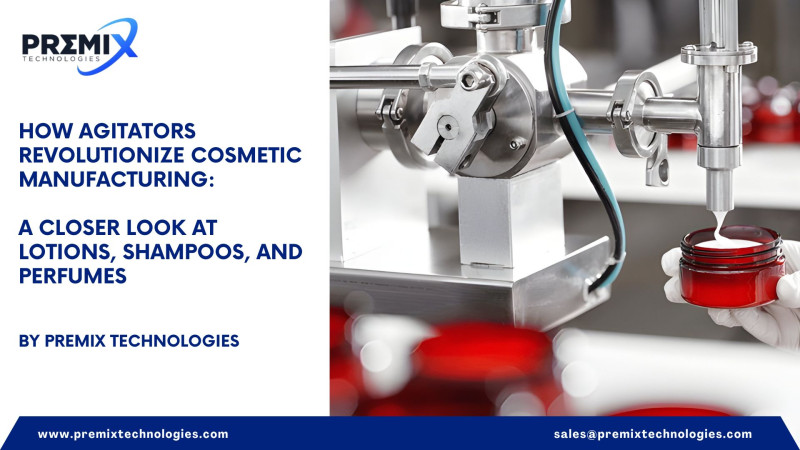How Agitators Revolutionize Cosmetic Manufacturing:
A Closer Look at Lotions, Shampoos, and Perfumes
The cosmetics industry thrives on innovation, quality, and consistency. Whether it's the smooth texture of a lotion, the luxurious feel of a shampoo, or the delicate balance of a perfume, every product relies on precise manufacturing processes to meet consumer expectations. At the heart of these processes are agitators, essential tools that ensure the perfect blend of ingredients in cosmetic production.
In this blog, we'll explore the critical role of agitators in the manufacturing of three key cosmetic products: lotions, shampoos, and perfumes. We'll examine the specific processes, the chemicals involved, and how the right choice of agitator can elevate the quality and appeal of these products.
1. Lotions and Creams: Mastering Emulsion Formation
Process: Emulsion Formation
Chemicals: Water, Oils (e.g., Jojoba Oil), Emulsifiers (e.g., Cetyl Alcohol)
Agitator Type: Anchor Agitators
Lotions and creams are staples in skincare, valued for their ability to moisturize and protect the skin. The secret to their effectiveness lies in the emulsion formation process, where water and oil phases are blended to create a smooth, homogenous product.
Anchor agitators are the preferred choice for this process. These agitators are designed to provide gentle yet thorough mixing, ensuring that the oil and water phases blend seamlessly without separating. The inclusion of emulsifiers like cetyl alcohol helps stabilize the mixture, resulting in a product with a creamy texture that spreads easily on the skin.
By using anchor agitators, manufacturers can achieve a consistent and stable emulsion, which is crucial for the lotion's effectiveness and shelf life. The right agitator not only enhances the product's texture but also ensures that active ingredients are evenly distributed, maximizing their benefits.
2. Shampoos and Conditioners: Perfecting Blending and Thickening
Process: Blending and Thickening
Chemicals: Surfactants (e.g., Sodium Lauryl Sulfate), Thickeners (e.g., Guar Gum), Fragrance
Agitator Type: Helical Ribbon Agitators
The production of shampoos and conditioners involves creating a product with the right viscosity, cleansing power, and sensory appeal. The blending and thickening process is essential to achieve a formula that cleanses effectively while leaving the hair soft and manageable.
Helical ribbon agitators are ideal for this process, as they provide efficient mixing of the various components, including surfactants, thickeners, and fragrances. Surfactants like sodium lauryl sulfate are responsible for the shampoo's cleansing action, while thickeners like guar gum contribute to the product's viscosity, ensuring it doesn't run off the hair too quickly.
Helical ribbon agitators ensure that these ingredients are evenly distributed throughout the mixture, resulting in a shampoo or conditioner with a consistent texture and performance. This uniformity is vital for consumer satisfaction, as it ensures that every use of the product delivers the expected results.
3. Perfumes: Crafting the Perfect Scent Through Solvent Mixing
Process: Solvent Mixing
Chemicals: Essential Oils, Alcohol (Ethanol), Fixatives
Agitator Type: Magnetic Stirrers
Perfumes are among the most complex cosmetic products, requiring a delicate balance of essential oils, alcohol, and fixatives to create a long-lasting and pleasing scent. The solvent mixing process is critical in achieving this balance, where precision and care are paramount.
Magnetic stirrers are commonly used in the production of perfumes, particularly in small-scale or artisanal manufacturing. These stirrers gently mix the essential oils with alcohol, ensuring that the volatile compounds are evenly distributed without introducing air bubbles, which can affect the fragrance's integrity.
The addition of fixatives, which help to anchor the scent and prolong its wear time, is also carefully managed using magnetic stirrers. By ensuring a uniform mixture, manufacturers can produce perfumes with a consistent and lasting fragrance, enhancing their appeal to consumers.
Conclusion
Agitators are indispensable in the cosmetics industry, playing a crucial role in the production of lotions, shampoos, and perfumes. By choosing the right agitator for each process, manufacturers can achieve the perfect blend of ingredients, resulting in products that meet the highest standards of quality and consistency.
From emulsifying lotions to blending shampoos and crafting delicate perfumes, the right agitation technology can make all the difference. Investing in advanced agitators not only improves product quality but also enhances manufacturing efficiency, allowing cosmetic brands to stay competitive in a rapidly evolving market.
Inquiry Now on www.premixtechnologies.com


